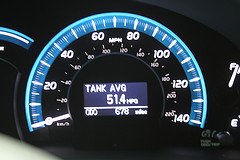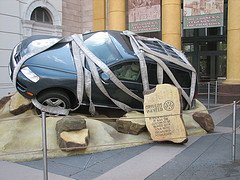| Our Mission |
|
Please Support Energize America |
 Get Cool EA Swag! |
What is EA 2020?
Contact Your Representatives...
User login
Links
Navigation
EA Team
Site Meter
Fee-bating toward an Energy Smart future: The French path
Energize America has long had a FeeBate incorporated into it to encourage a more rapid move toward more fuel efficient, lower polluting vehicles. Charge a sliding FEE on low mileage, high polluting vehicles and give a reBATE to high mileage, low polluting vehicles. Balance this such that the collected Fees pay a good share of the reBate costs.
more rapid move toward more fuel efficient, lower polluting vehicles. Charge a sliding FEE on low mileage, high polluting vehicles and give a reBATE to high mileage, low polluting vehicles. Balance this such that the collected Fees pay a good share of the reBate costs.
Slowly, the FeeBate concept is gaining momentum around the world. Earlier this month, the French government announced a FeeBate system with the "Ecological Bonus" applying to vehicles with low CO2 emissions. The highest bonus, 5000 Euros (roughly $7500) applies to super-low emitters, less than 60 g de CO²/km which includes electric vehicles (especially in France, with so much of the electricity from nuclear power).
The worst offenders will pay penalties of 2500 Euros. And, the regulations are planned with a constant strengthening, with 5 g de CO²/km reduction in each category every two years.
In terms of bonus, the following is the initial regulation:
- 1000 € for cars emitting less than 100 gCO2/km: (Think very small car, like the Smart)
- 700 € for vehicles emitting between 101 and 120 g CO² ;
- 200 € for emissions between 121 and 130 g CO²/km.
And, the penalties:
- 200 € for vehicles with emissions between 161 and 165 g CO²/km ;
- 750 € for emissions between 166 and
 200 g CO²/km ;
200 g CO²/km ; - 1600 € penalty fo remissions between 201 and 250 g CO²/km (Mercedes E-class, for example) ;
- 2600 € for emissions above 250 g CO²/km. (VW Toureg ... perhaps a new slogan, "No Drivers Wanted"?)
Trade-ins will be favored. Show up with a car over 15 years old and there is 300 € that the government will put on the table to retire the car.
France is not unique
Canada has the EcoAuto rebate program for which buyers (or someone signing a lease) can get $1000 or $2000 (by that way, that is real $s -- e.g., Canadian now). There is also an excise tax on fuel-inefficient vehicles, the Green Levy.
vehicle efficiency incentive (VEI) designed to promote the purchase of fuel-efficient vehicles in Canada.
The VEI includes:
- A rebate for highly fuel-efficient vehicles;
- A neutral treatment for vehicles of average fuel efficiency; and
- A new excise tax on fuel inefficient vehicles.
A FeeBate by any other name ...
The Canadian system is directly related to fuel efficiency (which basically links back to CO2 emissions). The fees start above 13 liters per 100 kilometers (equates to or about 22 miles per gallon). This is not a very strict standard but is a start. 16 liters per 100 km and the fee hits $CAN 4000.
NOW ... is this an option for California?
Considering what the Bush Administration has done recently in trampling states' rights (again):
shortly after George W. Bush signed the weakened Energy Bill into law, EPA administrator Stephen Johnson announced that California (and the 16 states that had pledged to adopt California’s standards) will not be granted a waiver from the clean air act to put stricter pollution controls on vehicles and drive a higher CAFE standard than is included in the Energy Independence and (in) Security Act.
California is going back to courts and, in the meantime, it is prevented from moving forward with what could be called the CA CAFE standards to help lower pollution from new cars and increase gas mileage.
Hmmmm...
Would the EPA, the Federal Government have any right to have a say on California pursuing a FeeBate system within its rights to impose property taxes.
Perhaps Ahnold should look to Canada, France, and Energize America for ideas on how to move forward toward less polluting vehicles on California's roads.
We can all help make
America
Energy Smart.Ask yourself:
Are you doing your part to
ENERGIZE AMERICA?
- Looking for additional ways to take action? Consider investing in a progressive future
Search
Latest News
Netroots Nation is going on right now - these links will take you to live blogs of the past two year's presentations:
The Energy Smart Communities Act of 2007
What people are saying about EA2020
This is the most comprehensive package of energy proposals, bar none, on the table today. It costs Exxon Mobil tens of millions of dollars to come up with policy proposals like this on the other side of the ledger -- all it cost EA was thousands and thousands of hours of
volunteer labor.
Recent blog posts
- Striving for W5 Solutions in the Stimulus Package
- The Organic Silver BB?
- Energizing America: Setting a Freshmen Agenda for Progress
- Eliminating 4% Of Global CO2 Emissions
- FESA not FISA: Energize America at Netroots Nation
- Energize America: FESA not FISA!
- Political action: Gas Prices
- Greening the School House
- Fee-bating toward an Energy Smart future: The French path
- THE Progressive Crises: Global Warming and Peak Oil
Who's new
- CoryT
- Rainvaree
- VefFreriAvvb
- domsnirmsips
- astemythert

